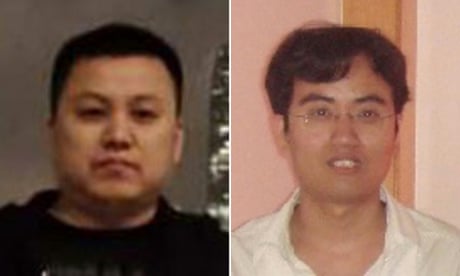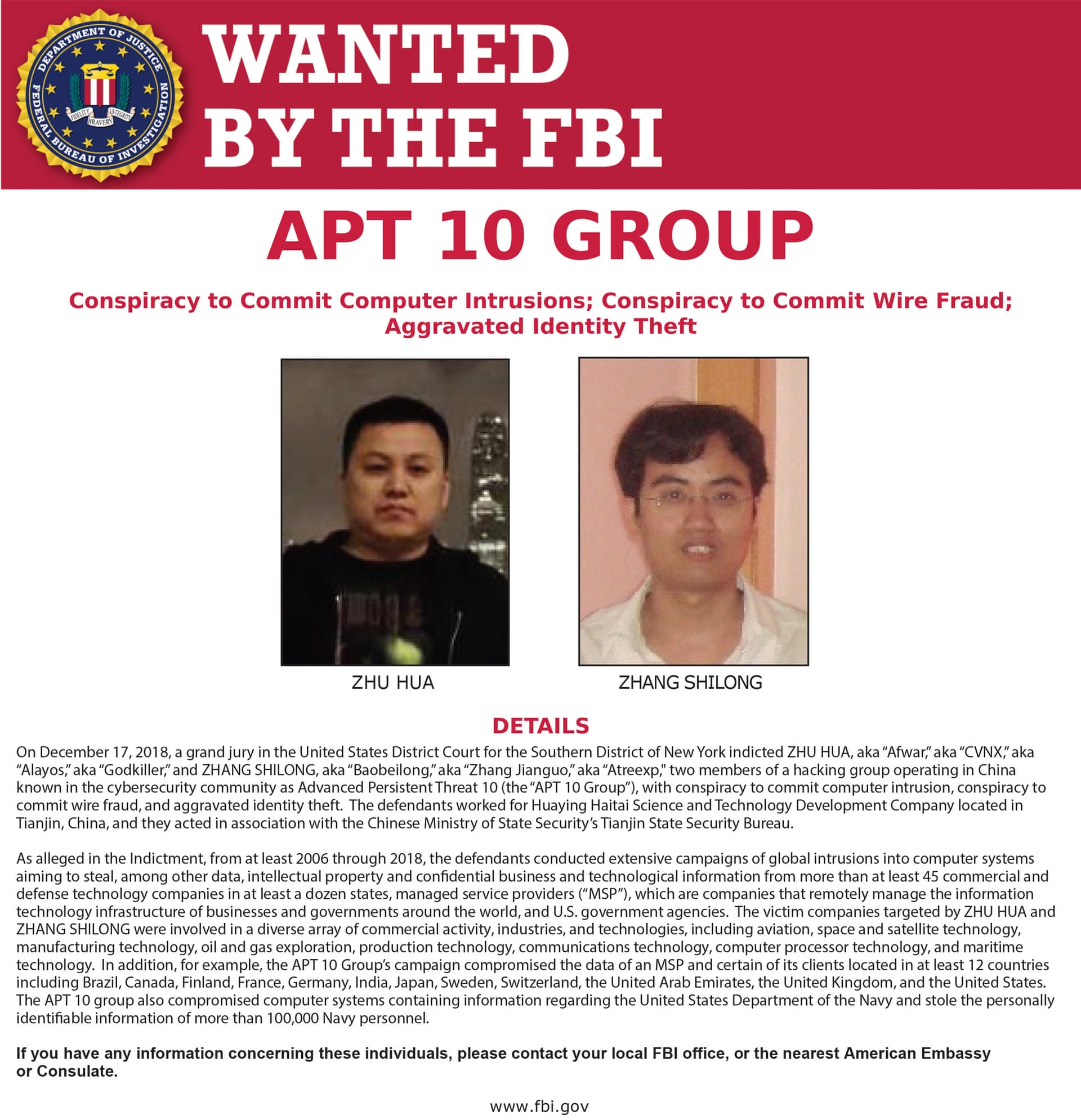By Patrick Wintour

'Godkiller' and 'Atreexp': the Chinese hackers accused of global attacks. Zhu Hua and Zhang Shilong, two members of a hacking group wanted by the FBI.
The US and UK have taken the unprecedented step of accusing hackers linked to the Chinese government of waging a sustained cyber-campaign focused on large-scale theft of commercial intellectual property.
Two Chinese nationals were charged in the US in relation to a campaign across Europe, Asia and the US that breached Chinese bilateral and international commitments, American prosecutors said.
A US indictment unsealed on Thursday in unison with a series of British statements accused Chinese hackers of obtaining unauthorised access to the computers of at least 45 entities, including commercial and defence technology companies and US government agencies such as Nasa and the US navy.
The UK Foreign Office and the US indictment allege that a group of Chinese was operating under the direction and protection of China’s main intelligence agency, the ministry of state security.
Two Chinese nationals were charged in the US in relation to a campaign across Europe, Asia and the US that breached Chinese bilateral and international commitments, American prosecutors said.
A US indictment unsealed on Thursday in unison with a series of British statements accused Chinese hackers of obtaining unauthorised access to the computers of at least 45 entities, including commercial and defence technology companies and US government agencies such as Nasa and the US navy.
The UK Foreign Office and the US indictment allege that a group of Chinese was operating under the direction and protection of China’s main intelligence agency, the ministry of state security.
The group was organised more like a corporation than a gang, a UK government official said.
“China’s goal, simply put, is to replace the US as the world’s leading superpower and they’re using illegal methods to get there,” the FBI director, Christopher Wray, said at a news conference.
“China’s goal, simply put, is to replace the US as the world’s leading superpower and they’re using illegal methods to get there,” the FBI director, Christopher Wray, said at a news conference.
The companies targeted by China were a “who’s who” of American businesses, he added.
The US justice department accused China of breaking a 2015 pact to curb cyber-espionage for corporate purposes.
One UK official said it was the most serious, persistent and widespread intrusion ever seen of globally significant companies.
“The tentacles of the campaign are vast,” the official said.
The issue has been raised privately at the highest levels with China for the best part of two years, including by Theresa May, British officials said.
The issue has been raised privately at the highest levels with China for the best part of two years, including by Theresa May, British officials said.
But the hacking had not stopped, which was why the Chinese were being challenged in public, they added.
In the unsealed US indictment, prosecutors accuse Zhu Hua and Zhang Shilong of acting on behalf of China’s ministry of state security to spy on some of the world’s largest companies by hacking into technology firms to which they outsource email, storage and other computing tasks.
In the unsealed US indictment, prosecutors accuse Zhu Hua and Zhang Shilong of acting on behalf of China’s ministry of state security to spy on some of the world’s largest companies by hacking into technology firms to which they outsource email, storage and other computing tasks.
FBI wanted poster. Photograph: FBI
Court papers filed in Manhattan federal court say the victims were in a variety of industries from aviation and space to pharmaceutical technology.
Prosecutors claim the hackers were able to steal “hundreds of gigabytes” of data.
The UK foreign secretary, Jeremy Hunt, said: “This campaign is one of the most significant and widespread cyber-intrusions against UK and allies uncovered to date, targeting trade secrets and economies around the world... These activities must stop.”
Britain said it was taking no immediate punitive action but would lead a government-guided review of major companies’ security in the new year to better protect them.
New Zealand’s spy agency confirmed on Friday that it had established links between the Chinese ministry of state security and a global campaign of cyber-enabled commercial intellectual property theft, first becoming aware of the activity in early 2017.
“This long-running campaign targeted the intellectual property and commercial data of a number of global managed service providers, some operating in New Zealand,” director-general of the GCSB Andrew Hampton said.
Hampton said the National Cyber Security Centre issued advice to New Zealand organisations on how to protect their networks.
Britain said it was taking no immediate punitive action but would lead a government-guided review of major companies’ security in the new year to better protect them.
New Zealand’s spy agency confirmed on Friday that it had established links between the Chinese ministry of state security and a global campaign of cyber-enabled commercial intellectual property theft, first becoming aware of the activity in early 2017.
“This long-running campaign targeted the intellectual property and commercial data of a number of global managed service providers, some operating in New Zealand,” director-general of the GCSB Andrew Hampton said.
Hampton said the National Cyber Security Centre issued advice to New Zealand organisations on how to protect their networks.
Around a third of the serious incidents recorded by the NCSC could be linked to state-sponsored actors, Hampton said.
Over the past few years, as companies around the globe have sought to cut down information technology spending, they have increasingly relied on outside contractors to store and transfer their data.
When a managed service provider is hacked, it can unintentionally provide attackers access to secondary victims who are customers of that company and have their computer systems connected to them, according to experts.
The timing of the action coincides with the arrest of Meng Wanzhou, the chief financial officer of Chinese telecommunications giant Huawei Technologies, in Canada at the request of the US.
Over the past few years, as companies around the globe have sought to cut down information technology spending, they have increasingly relied on outside contractors to store and transfer their data.
When a managed service provider is hacked, it can unintentionally provide attackers access to secondary victims who are customers of that company and have their computer systems connected to them, according to experts.
The timing of the action coincides with the arrest of Meng Wanzhou, the chief financial officer of Chinese telecommunications giant Huawei Technologies, in Canada at the request of the US.

Aucun commentaire:
Enregistrer un commentaire